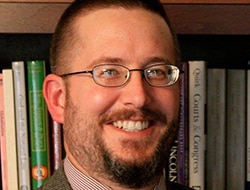
The American political theorist James Burnham is best known (to the extent that he is still known at all) for his 1941 book “The Managerial Revolution.” In large part, that’s because George Orwell found Burnham’s description of a new bureaucratic regime then coming into being so repellent that he extrapolated it out 40 years into the future in his novel 1984.
But there was more to Burnham than “The Managerial Revolution,” including his spirited defense of Machiavelli as something other than the amoral caricature that his name has come to denote, and his defense of Congress as the central institution of American constitutionalism. A Catholic by birth, Burnham was by turns an atheist, a Trotskyite, and one of the chief architects of midcentury American conservatism before returning to the Church shortly before his death in 1987.
All of Burnham’s books are well worth reading, but he never developed one of his greatest insights into a book. It’s a line that I’ve come back to many times over the years: “Where there’s no solution, there’s no problem.”
That may sound pessimistic, defeatist, or even just frustratingly blasé. But like Robert Frost’s line that “I can see no way out but through,” there’s more here than first meets the eye.
There are problems to which there is no solution. Despite the dreams of men since the dawn of the Renaissance down to certain tech titans today, death is not something that can be generally overcome. There is no solution to the metaphysical problem of death; hence, it’s not truly a problem. We live with it; we wrestle with it; we incorporate the knowledge of its inevitability into our personal lives and the life of our culture.
But even though death will come for us all, not everything that can bring about death is inevitable. Every year, we cure more and more diseases that in the past were an automatic death sentence. That we were able to find a solution means that there was a problem to be solved.
Like death, other major social ills are intractable if we view them only in the aggregate. There is no solution to poverty, to hunger, to racism, to abortion, to drug abuse, to domestic violence, to murder. But there are solutions to his poverty, her hunger, to race relations in this town, to the despair experienced by that mother which has introduced into her thoughts the idea of killing her own child. When we approach each of these conditions on a human level, in concrete circumstances, they are problems that we can solve, but when we address them in the abstract, the problem disappears, because there can be no solution that could bring them to an end for everyone.
Yet the trend of the modern world — again, from the Renaissance on — has been to insist on addressing these conditions in the abstract. We wage a War on Poverty and a War on Drugs and start a National Dialogue on Race. And from the beginning, we have set ourselves up for failure, because there can be no solution that encompasses all. Hence, there is no problem.
And to be frank, sometimes that’s what we want, and for the most human of reasons — our personal convenience. It’s easier to write a check to a lobbying organization that has promised for nearly 50 years to overturn Roe v. Wade and thus solve the problem of abortion than it is to start a pregnancy care center or even just to volunteer at one, and save a baby who may live a full life without Roe ever being reconsidered by the U.S. Supreme Court. It’s easier to elect a black man as president and call it a day than it is to address problems with policing or housing or employment discrimination in our own back yards. It’s easier to praise Mother Teresa for her work with the poor and hungry and dying in the streets of Calcutta than it is to do what she always told others to do: find the poor and the hungry and the dying in your town, and minister to them.
The Catholic principle of subsidiarity has been maligned, distorted and often simply ignored in recent decades. Even many Catholics who use the word misunderstand what it really means. They approach it in the same way that the modern world approaches politics and economics: from the top down. But the core principle at the heart of subsidiarity is that authority flows from the basic building block of society — the family — outward. Subsidiarity requires that the authority proper to the family should never be usurped by the local government, and that proper to local government never by the state, and that proper to the state should remain with the state, and not be usurped by the federal government. (The same principle applies in economics and in society in general.)
In the abstract, this may seem unimportant. If things need to be done, does it matter whether my family, or my town, or my state, or the federal government does them? Well, yes — because there are many problems that can only be solved when we address them, not in the aggregate, but in the most direct way possible, person to person, face to face. When those who should properly address them choose not to, or are prevented from doing so by others “above” them, those problems can grow so large that they eventually become incapable of being solved.
And where there’s no solution, there’s no problem.
Scott P. Richert is publisher for OSV.





